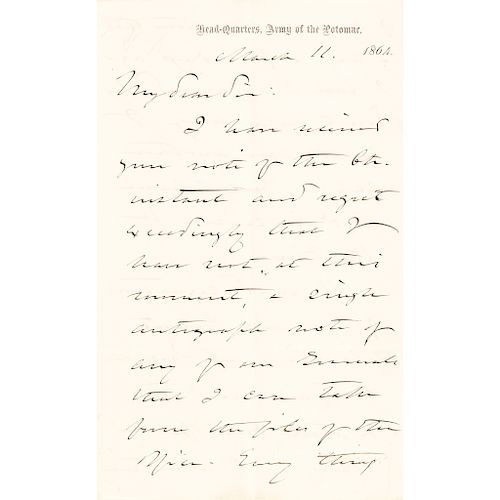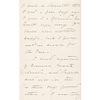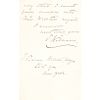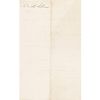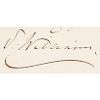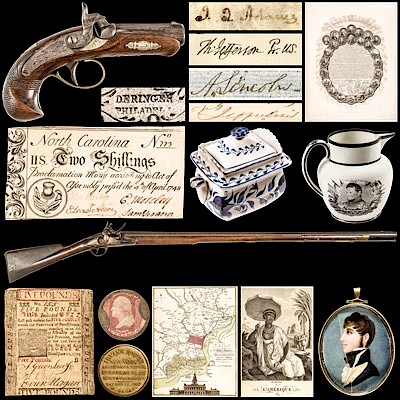1864 Civil War SETH WILLIAMS Historic Autograph Related Content Letter Signed!
Lot 123
Categories
Estimate:
$500 - $600
Absentee vs Live bid
Two ways to bid:
- Leave a max absentee bid and the platform will bid on your behalf up to your maximum bid during the live auction.
- Bid live during the auction and your bids will be submitted real-time to the auctioneer.
Bid Increments
| Price | Bid Increment |
|---|---|
| $0 | $10 |
| $200 | $20 |
| $300 | $25 |
| $500 | $50 |
| $1,000 | $100 |
| $2,000 | $200 |
| $3,000 | $250 |
| $5,000 | $500 |
| $10,000 | $1,000 |
| $20,000 | $2,000 |
| $30,000 | $2,500 |
| $50,000 | $5,000 |
| $100,000 | $10,000 |
| $200,000 | $20,000 |
| $300,000 | $25,000 |
| $500,000 | $50,000 |
About Auction
By Early American History Auctions
Oct 19, 2019
Set Reminder
2019-10-19 12:00:00
2019-10-19 12:00:00
America/New_York
Bidsquare
Bidsquare : Historic Autographs-Currency-Political-Americana-Militaria-Guns
https://www.bidsquare.com/auctions/early-american-history-auctions/historic-autographs-currency-political-americana-militaria-guns-4513
326 Lots of Rare, Historic Autographs, Americana, Civil War Era, George Washington, Abraham Lincoln, Black History, Revolutionary War Era, Colonial America, Federal Period, War of 1812, Colonial Currency, Indian Peace Medals & more... Early American History Auctions auctions@earlyamerican.com
326 Lots of Rare, Historic Autographs, Americana, Civil War Era, George Washington, Abraham Lincoln, Black History, Revolutionary War Era, Colonial America, Federal Period, War of 1812, Colonial Currency, Indian Peace Medals & more... Early American History Auctions auctions@earlyamerican.com
- Lot Description
Autographs
SETH WILLIAMS "I have not at this moment a single autograph note of any of our Generals that I can take..." He Delivered General Grant's "Terms" at the Appomattox Courthouse Surrender
SETH WILLIAMS (1822-1866). Major General of the Union Army of the Potomac during the American Civil War, he Delivered General Grant's "Terms" to the Confederate army at the Appomattox Courthouse Surrender and was present on April 9, 1865.
March 11, 1864-Dated Civil War, Historic Autograph Related Content, Autograph Letter Signed, "S. Williams," 3 pages, Head-Quarters, Army of the Potomac, regarding Autograph Collecting Content, Choice Extremely Fine. Williams served as Inspector General on the staff of Lt. General Ulysses S. Grant from the spring of 1864 to February 9, 1866. When Grant decided to recommend surrender to Robert E. Lee during the Appomattox Campaign, it was Williams who took the message to the Confederate lines. He also delivered Grant's terms to the Confederate army. He was present at the surrender on April 9, 1865.
This Letter is written to Sidney Webster, sending signatures (not present) of Generals Grant, Meade, and Ingalls for the Sanitary Commission Fair. The U.S. Sanitary Commission held fairs to raise funds to support sick and wounded Union soldiers. In 1864 President Lincoln signed a limited edition run of 48 Copies of the Emancipation Proclamation produced to be sold for $10 each at the Philadelphia Sanitary Fair. The funds raised from their sales was to be used to hire nurses, buy needed Civil War medication, supplies, etc. This Letter reads, in part:
"I... regret exceedingly that I have not at this moment a single autograph note of any of our Generals that I can take from the files of the office. Every thing of such a character that I had a few days ago I gave to a friend. No doubt before long I shall have another supply, but I fear not in season for the Fair. ... I send signatures of Generals Grant Meade, and Ingalls, and will in two or three days forward others. I am truly sorry that I cannot fully comply with Mrs. Webster's request."
This rare "Autograph Collecting" content Letter shows normal folds but is in otherwise choice condition. A wonderful opportunity.
Williams was promoted to the rank of major in August 1861 and lieutenant colonel on July 7, 1862. On September 28, 1861, President Abraham Lincoln appointed Williams a brigadier general of volunteers, to rank from September 23, 1861.
President Lincoln nominated Williams for the promotion on December 21, 1861 and the U.S. Senate confirmed the appointment on July 17, 1862. He was a groomsman at George McClellan's wedding in New York City on May 22, 1860.
Seth Williams served as assistant adjutant general to Major General George B. McClellan in the Department of the Ohio in the summer of 1861. From August 20, 1861 to March 1864, Williams was assistant adjutant general of the Army of the Potomac, responsible for the routine drafting of orders, correspondence, and reports. McClellan named him to that position after unsuccessfully requesting the assignment to Maj. Gen. Fitz John Porter.
McClellan and Williams became friends during their service together. Williams was called before the United States Congress Joint Committee on the Conduct of the War to testify about the Battle of Gettysburg. Williams's testimony was especially helpful to Meade.
Williams later served as inspector general on the staff of Lt. Gen. Ulysses S. Grant from the spring of 1864 to February 9, 1866. When Grant decided to recommend surrender to Robert E. Lee during the Appomattox Campaign, it was Williams who took the message to the Confederate lines. He also delivered Grant's terms to the Confederate army. He was present at the surrender on April 9, 1865.
Williams was awarded the brevet of colonel for the Battle of Gettysburg. On January 13, 1866, President Andrew Johnson nominated Williams for the brevet grade of major general of volunteers for his service in 1863 and 1864, to rank from March 13, 1865, and the U.S. Senate confirmed the nomination on March 12, 1866.
Although slated to begin service as assistant adjutant general of the Military Division of the Atlantic, Williams became ill later that month and left for Boston, Massachusetts. There he died of a brain ailment, described as an "inflammation" on March 23, 1866. He was buried in Augusta's Forrest Grove Cemetery. Fort Williams on Cape Elizabeth, Maine, is named for him. The name was assigned on April 13, 1899.
On April 10, 1866, President Andrew Johnson nominated Williams posthumously for appointment to the brevet grade of brigadier general in the regular army, to rank from March 13, 1865 and the U.S. Senate confirmed the appointment on May 4, 1866.
On July 17, 1866, President Johnson nominated Williams posthumously for appointment to the brevet grade of major general in the regular army, to rank from March 13, 1865 and the U.S. Senate confirmed the appointment on July 23, 1866.
- Shipping Info
-
Early American provides in-house worldwide shipping. Please contact us directly if you have questions about your specific shipping requirements.
-
- Buyer's Premium



 EUR
EUR CAD
CAD AUD
AUD GBP
GBP MXN
MXN HKD
HKD CNY
CNY MYR
MYR SEK
SEK SGD
SGD CHF
CHF THB
THB